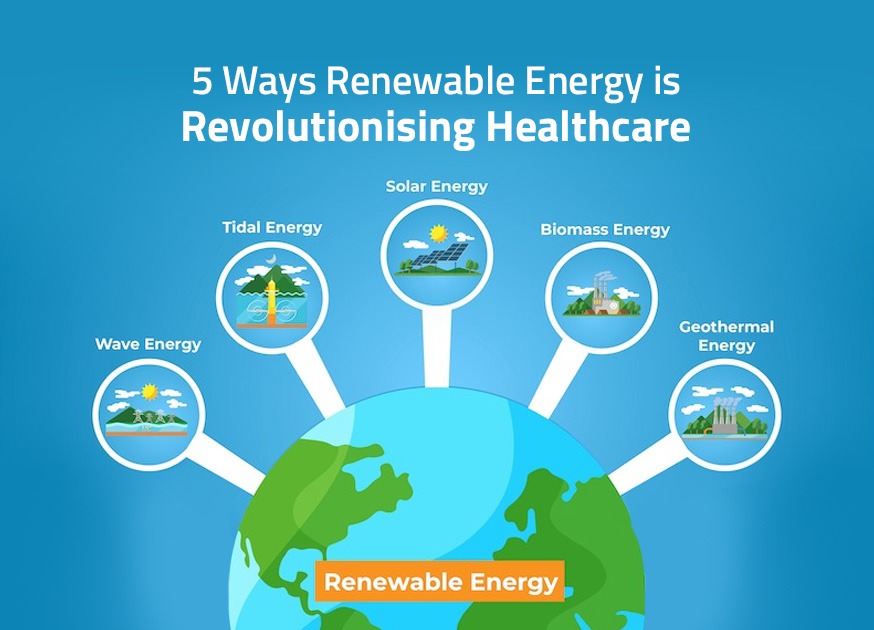
In recent years, there has been a significant shift towards renewable energy sources as a means of combating climate change and reducing reliance on fossil fuels. While this transition is frequently associated with industries such as transportation and manufacturing, the healthcare industry has also been swift to incorporate renewable energy solutions.
Renewable energy is revolutionizing healthcare in a variety of ways, from powering hospitals with solar panels to using geothermal energy for heating and cooling systems. We will look at five ways that renewable energy is altering the healthcare industry and increasing patient outcomes in this post.
1. Empowering healthcare in low-income nations
The inability of poor countries to provide basic healthcare services is hampered by a lack of reliable access to energy. Medical institutions in many distant places rely on expensive and unreliable diesel generators, making it difficult to deliver the required care. This is where renewable energy comes into the picture.
The UNDP Solar for Health initiative exemplifies how renewable energy may be used to enhance healthcare in developing countries. The project assists countries in building solar photovoltaic systems at health centers and storage facilities in remote and difficult-to-reach places. These systems provide a consistent source of electricity that can power critical medical equipment and refrigeration systems, allowing medical personnel to give high-quality treatment to their patients.
UNDP has sponsored nearly 900 health centers and storage facilities in Angola, Chad, Liberia, Libya, Namibia, Nepal, Sudan, South Sudan, Yemen, Zambia, and Zimbabwe, with funding mostly provided by the Global Fund to Fight AIDS, Tuberculosis, and Malaria. As a result, an estimated 34.5 million people now have access to reliable health care.
In addition to enhancing healthcare access, the UNDP Solar for Health initiative helps to create jobs and encourage economic growth in these impoverished countries. These countries are creating a more sustainable future for themselves and future generations by investing in renewable energy.
2. Transforming medical waste disposal
Renewable energy provides a long-term solution for medical waste disposal, which is critical for lowering contamination and infection concerns. Conventional medical waste treatment methods rely on fossil fuels, which are costly and contribute to greenhouse gas emissions. Renewable energy sources including solar, wind, and geothermal energy can assist in minimising dependency on fossil fuels and reduce the environmental impact of medical waste treatment.
Solar-powered incinerators and sterilization units have been successfully deployed in several nations, providing dependable and sustainable methods of disposing of medical waste and sterilizing medical equipment. Even though the initial expenditure may be more than for standard systems, these renewable energy solutions can save money in the long term.
Renewable energy systems offer lower operating and maintenance expenses, making them more cost-effective over time. Additionally, healthcare institutions can lower trash disposal costs and associated environmental and health hazards by reducing waste and minimizing the usage of disposable single-use goods. In other words, Renewable energy has the potential to encourage sustainable healthcare practices by reducing waste output and lowering the environmental effect of healthcare operations.
3. Reducing healthcare expenses
Renewable energy systems can also encourage economic growth and offer job possibilities, which can help to reduce healthcare expenses indirectly. Renewable energy system installation, maintenance, and operation demand qualified employees, which creates jobs and boosts local economies. This can result in increased tax revenues and economic development, as well as more resources for healthcare delivery and, eventually, lower healthcare expenditures.
4. Consistent supply of electricity in health sectors
Natural disasters can cause power outages, which can have major effects on healthcare facilities. Medical equipment and facilities require a consistent supply of electricity to work properly, and power outages can result in the loss of important patient data and even death. Renewable energy solutions, such as solar panels and wind turbines, can offer backup power during catastrophes, ensuring that healthcare services continue uninterrupted. Healthcare institutions can be better prepared to respond to calamities and continue delivering important healthcare services to their communities by adding renewable energy systems into disaster resilience plans.
5. Zero carbon emission
Unlike traditional fossil fuel-based energy sources, renewable energy sources such as solar, wind, and hydropower create electricity without generating greenhouse gases. Renewable energy can help to mitigate climate change, which is a major threat to global public health, by reducing greenhouse gas emissions. Climate change has been related to a variety of health issues, such as respiratory disorders, hunger, and the spread of infectious diseases.
Healthcare institutions revolutionizing the world by adopting Renewable energy resources
Healthcare institutions can minimize their carbon footprint and contribute to a more sustainable future for all by promoting the use of renewable energy. This helps not only public health but also promotes a healthier atmosphere for both healthcare personnel and patients.
(i) The Narayana Health Group is one example of an Indian healthcare organization that is leading the way in revolutionizing the healthcare sector with renewable energy. Several sustainable energy initiatives, such as the installation of solar panels and wind turbines, have been implemented across the company’s hospitals. These approaches were successful in not only lowering the company’s carbon footprint but also in lowering its energy bills.
(ii) Another noteworthy example is the Fortis Healthcare company, which has made significant investments in renewable energy solutions. The corporation has reduced its energy expenditures by up to 30% by integrating solar panels throughout its premises. Fortis Healthcare has also installed energy-efficient lighting and HVAC systems to further reduce its energy consumption.
Furthermore, the use of renewable energy solutions has the potential to benefit the entire healthcare industry. These advantages might range from increasing access to healthcare in low-income countries to lowering healthcare expenditures and maintaining a consistent supply of electricity during natural disasters.
On the other hand, traditional fuels’ negative repercussions, such as their contribution to greenhouse gas emissions and high costs, cannot be overlooked. As a result, the healthcare business must seize the opportunities provided by renewable energy and transition to a more sustainable and ecologically friendly future.
Leave a Reply